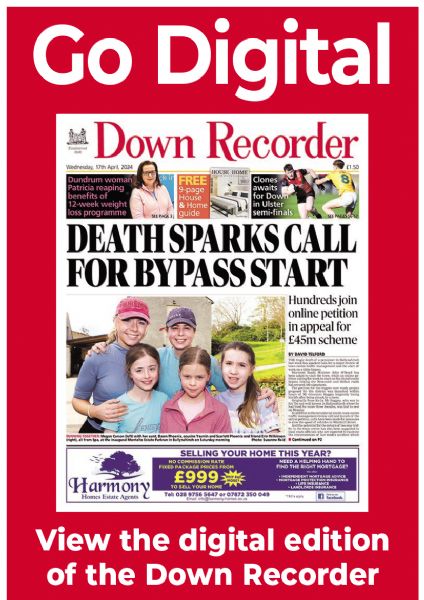Appeal for fair balance of rural health services
Appeal for fair balance of rural health services
22 June 2022
HEALTH campaigners have this week called for the discrimination against rural communities to be addressed.
The appeal by the Down Community Health Community Committee comes as the deadline for responses to the Department of Health’s
consultation on the future of urgent and emergency care draws near.
Campaigners are urging interested individuals, groups and organisations to respond to the consultation which ends on July 1 as it is essential that local voices are heard on such a crucial matter.
The health committee said its view is that there needs to be a “fair distribution” of health and social care services across the jurisdiction and that health inequalities — including the discrimination against rural communities — must now be addressed.
“This is especially so in areas where the population is growing fast and where the age profile is changing,” said a campaign group spokesman.
“It is quite obvious that the vast, sprawling rural East Down area needs an emergency department operating 24-hours a day, seven days a week. This is particularly important in an area such as ours, which suffers from dreadful transport infrastructure and a woefully inadequate ambulance service.
“The current distortion to the entire urgent and emergency care framework, as a consequence of the Belfast parish pump politics leading to an inappropriate concentration of services in and around Belfast, whilst services are denied to our community, cannot continue.”
The spokesman said rural citizens across Northern Ireland have the right to access the services that they pay for through their tax and National Insurance contributions.
“We have rights and these rights cannot be denied to us,” the spokesman declared. “Whilst there are some welcome points in the consultation document, we feel that there are some that require challenge.
“The document does not specify how many emergency departments there would be and where they would be located. Nor does it specify their grade.
“It is essential that the statistical analyses underlying the proposals reflects the pre-Covid experience, rather than the inevitably heavily distorted period since the Covid emergency began.”
The spokesman argued that if urgent care centres are to be the way ahead, they must contain for the Down area, precisely the same services that people enjoyed over a decade ago, pre any so-called “temporary” reductions in service and delivered on a 24-hour basis.
In addition, he said confidence would be greatly increased if local people were assured, for example, that there might be three urgent care centres in the Greater Belfast area but that, to improve efficiency, there would only be one Type 1 emergency department.
He continued: “We believe that a categorical assurance is required for our area that there will be a permanent and substantial out of hours GP service available in Downpatrick.
“We are unconvinced as to the benefits of a telephone first service. If that is indeed the way ahead, we wonder why it has not already been implemented in Belfast? Surely the big city with all the problems in its emergency departments needs much more of this?”
The health committee spokesman also contended that the urgent and emergency care review “fails to fully recognise” an essential element in the genesis of the emergency care problem — that historic obsessions with centralisation and bed reductions has not served anyone well, as was so aptly demonstrated during the Covid emergency.
He said campaigners are calling on all politicians, including those of the five parties that took place in last week’s health summit in Belfast, to place full details of the information at their disposal about proposed changes into the public domain now.
The spokesman added: “The entire community across the North needs to be given full details of what is proposed. Otherwise, the people of Northern Ireland may well feel that they are being asked to buy into a “pig in a poke”.
“Change is only acceptable where it delivers a better service. The people of East Down have suffered a great deal.
“The time has come to redress the imbalance and if a fair and equitable distribution of services is not to be offered to East Down, the 25,000 people who took to the streets in 2015, may well find it necessary to do so again.”
Responses in writing to the urgent and emergency care consultation can be made to the consultation team the Department of Health, Regional Health Transformation Directorate, Annex 3, Castle Buildings, Stormont, Belfast BT4 3SQ. Responses can be emailed to UECS@health-ni.gov.uk

